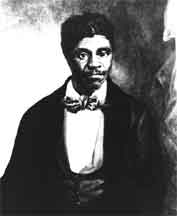1857- Dredd Scott Decision

Dredd Scott
Dred Scott was a slave who sued for his freedom. The Supreme Court, in a far-reaching ruling, on March 6 1857, stated that Negroes were not citizens and had no right to sue. In addition, it ruled that the Missouri Compromise was illegal, in that it denied slave owners the right to bring their property (slaves) into free territories..
Dred Scott was enslaved in Missouri, a slave state, but had lived for a period of time in free states and territories where slavery was prohibited. Scott argued that his residence in free territory made him a free man, as he claimed that being on free soil meant he should no longer be considered a slave. The case eventually reached the Supreme Court.
In the majority opinion written by Chief Justice Roger B. Taney, the Court ruled against Dred Scott. The decision had several key elements:
-
Jurisdictional Issue: The Court first addressed the question of whether Scott, as an enslaved person, had the right to sue in federal court. The Court held that enslaved individuals, as well as their descendants, were not considered U.S. citizens and thus could not bring a lawsuit in federal court.
-
Property Rights: The Court then addressed the issue of property rights, specifically whether slaveholders could be deprived of their property (i.e., enslaved individuals) when traveling to free territories. The Court ruled that slaveholders had the constitutional right to take their slaves into any territory, regardless of its status as free or slave.
-
Fifth Amendment Protection: The Court further held that Congress lacked the power to prohibit slavery in any territory. The Court reasoned that such an act would violate the Fifth Amendment of the Constitution, which protects private property rights. This part of the decision effectively invalidated the Missouri Compromise of 1820, which had restricted the expansion of slavery in certain territories.
The Dred Scott decision had profound implications. It reinforced and solidified the institution of slavery by declaring that enslaved individuals were property and not entitled to the rights and protections of citizenship. It also rejected the idea that Congress had the authority to restrict the expansion of slavery into new territories.
The decision was highly controversial and exacerbated the tensions between the North and South in the lead-up to the American Civil War. It further polarized public opinion on the issue of slavery, fueling abolitionist sentiments in the North and angering proponents of slavery in the South. Ultimately, the Dred Scott decision is considered one of the key factors that escalated the sectional conflict and contributed to the eruption of the Civil War.
 >
>